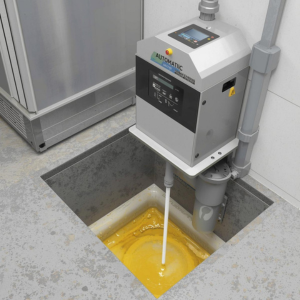How can I make grease trap maintenance easier in my café or restaurant?
Grease trap maintenance can be a hassle in a busy café or restaurant—but it doesn’t have to be. With the right systems and products in place, you can prevent blockages, reduce bad smells, and save on costly plumbing bills. This blog explores practical tips for simplifying grease trap maintenance while staying compliant with New Zealand's food service regulations.
Why is grease trap maintenance essential in food businesses?
Cafés and restaurants produce large amounts of fats, oils, and grease (FOG), which can clog drains and damage plumbing if not properly managed. Grease traps help separate these substances from wastewater, but without regular upkeep, they become inefficient and hazardous.
Neglecting your grease trap can result in:
-
Foul odours in your kitchen and dining areas
-
Emergency plumbing call-outs
-
Fines from local councils
-
Business downtime
Staying on top of maintenance protects your operations, reputation, and budget.
For a deeper dive into what could go wrong without regular maintenance, check out our article: The Hidden Dangers of Neglecting Your Commercial Grease Trap.
1. Use enzyme cleaners for daily maintenance
Enzyme cleaners use natural bacteria and enzymes to break down FOG in your grease trap. They are:
-
Eco-friendly and non-corrosive
-
Safe for use in food prep environments
-
Effective at preventing blockages and odours
By dosing your trap regularly with enzyme cleaner, you reduce the need for frequent pump-outs and emergency repairs.
Need a refresher on how these cleaners work? Read our blog: How do enzyme cleaners work in grease traps?.
2. Install an automatic dosing machine
An automatic dosing system ensures consistent enzyme application without relying on staff. These machines:
-
Dispense enzymes at optimal times (e.g. overnight)
-
Save time and reduce human error
-
Help maintain council compliance
Ideal for high-volume cafés and restaurants, dosing machines eliminate the guesswork and keep your grease trap in top shape.
3. Create a simple maintenance schedule
Avoid last-minute surprises by setting a recurring maintenance routine. Include:
-
Daily checks for smells or slow drainage
-
Weekly enzyme top-ups (if not using a dosing machine)
-
Monthly inspections of trap performance
-
Scheduled professional pump-outs every 3–6 months (or as needed)
Using a checklist can help keep your team on track.
4. Train your staff
Make sure your kitchen team knows:
-
What goes into the sink (and what doesn’t)
-
How to spot early warning signs of grease build-up
-
When and how to dose the trap (if manual)
Educated staff play a big role in preventing grease-related issues.
If you're wondering how to make grease trap maintenance easier in your café or restaurant, check out our article: How can I make grease trap maintenance easier in my café or restaurant?
5. Use the right products from trusted suppliers
At Insinc Products, we offer a curated selection of enzyme cleaners and automatic dosing systems specifically designed for New Zealand hospitality businesses. Our solutions make grease trap maintenance simple, compliant, and cost-effective.
Explore our commercial kitchen products or get in touch for expert advice tailored to your café or restaurant.
Frequently Asked Questions (FAQ)
Q: How often should I clean my café or restaurant grease trap? A: While professional pump-outs are typically required every 3–6 months, using enzyme cleaners daily or via an automatic dosing system can significantly reduce build-up between services.
Q: Are enzyme cleaners safe to use in food prep areas? A: Yes, enzyme cleaners are non-toxic, non-corrosive, and biodegradable—making them ideal for commercial kitchen use.
Q: What are signs that my grease trap needs attention? A: Slow draining sinks, foul odours, and grease overflow are clear signs that your trap requires cleaning.
Q: What’s the benefit of using a dosing machine? A: Dosing machines offer automated, consistent enzyme application—saving staff time and reducing the risk of human error.
Q: Can I switch from chemical cleaners to enzymes? A: Absolutely. Enzyme cleaners are more sustainable, gentle on pip
https://www.insinc.co.nz/grease-trap-cleaners.html
Posted: Friday 7 November 2025


